Lawsuits
$10,000 handshake
Must have been quite a handshake.
Redlands Daily Facts - June 30, 1977
Posted By: Alex - Fri Jul 31, 2020 -
Comments (1)
Category: Lawsuits, 1970s
The Only Legal Non-Burger King Burger King
I discovered this story in SECRET AMERICA: A GUIDE TO THE WEIRD, WONDERFUL, AND OBSCURE.See preview here.
The book is part of a series devoted to different cities, and if the national version is a good example, the individual volumes are probably worth your attention as well.
In any case, here's the lowdown on the Burger King of Mattoon, IL.
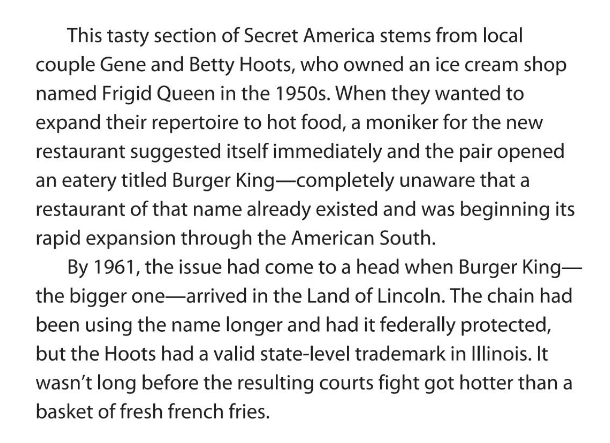
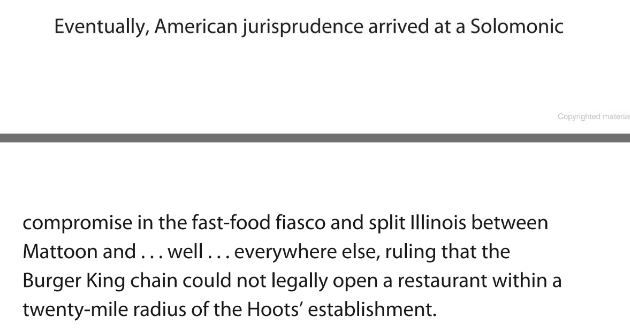
Posted By: Paul - Fri Jul 17, 2020 -
Comments (1)
Category: Business, Food, Regionalism, Lawsuits
Marriage ruined by Rod Stewart’s soccer ball
Rod Stewart is known to be a huge soccer fan, and at his concerts he often kicks soccer balls out into the audience.At a 1989 concert, a ball struck the hand of a woman in the audience, Patricia Boughton, who subsequently sued Stewart claiming the incident had permanently injured her middle finger.
Her husband later also filed suit, on the grounds that his wife's hand injury had led to the breakup of their marriage. He explained, "If she hit that hand on something it was all over. To get into sexual activity, it was very difficult... It was like walking around trying not to break something."
Stewart eventually settled the suit for $17,000, which was less than the Boughtons had been hoping for.

Lansing State Journal - Oct 11, 1992
However, Stewart didn't stop kicking balls at his concerts. And as UltimateClassicRock.com reports, the injuries continued. At a 2002 concert, a man suffered a broken little finger after shielding his face from one of Stewart's balls. And another fan had his nose broken when it was hit by a soccer ball at a 2012 concert in Las Vegas.
In response to the lawsuits, Stewart has said that fans should know that his concerts are a "contact sport."
The video below shows Stewart kicking soccer balls at a concert.
Posted By: Alex - Wed May 06, 2020 -
Comments (4)
Category: Lawsuits
The Rewards of Heroism
If there were a Cheapskate's Hall of Fame, the Chicago Board of Education would surely have to be in it. In 1994, after gym teacher Clarence Notree heroically saved a group of children from a gunman who had entered the school gym by shielding them with his body, the Board of Education informed him that he wasn't entitled to Workers Compensation for his injuries because saving children wasn't technically part of his job.After a protracted legal battle, he did finally get a settlement of $13,447.
More info: NY Times

Opelousas Daily World - Sep 30, 1994

Franklin Daily Journal - Sep 30, 1994
Posted By: Alex - Fri Jun 14, 2019 -
Comments (0)
Category: Jobs and Occupations, Lawsuits, 1990s
Flying Body Parts Lawsuit
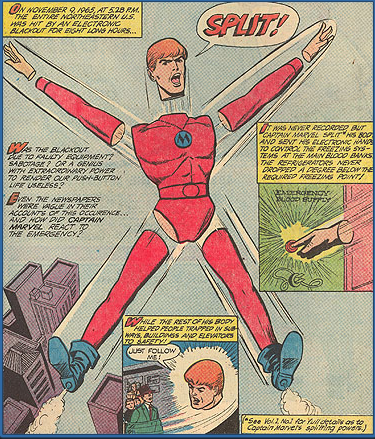
Ruling in what it called a "tragically bizarre" case, an appeals court found that the estate of a man killed by a train while crossing the Edgebrook Metra station tracks can be held liable after a part of his body sent airborne by the collision struck and injured a bystander.
In 2008, Hiroyuki Joho, 18, was hurrying in pouring rain with an umbrella over his head, trying to catch an inbound Metra train due to arrive in about five minutes when he was struck by a southbound Amtrak train traveling more than 70 mph.
A large portion of his body was thrown about 100 feet on to the southbound platform, where it struck Gayane Zokhrabov, then 58, who was waiting to catch the 8:17 a.m. train to work. She was knocked to the ground, her leg and wrist broken and her shoulder injured.
More details at the source.
Posted By: Paul - Mon May 20, 2019 -
Comments (1)
Category: Accidents, Body, Death, Lawsuits, Trains and Other Vehicles on Rails, Twenty-first Century
Man sues God
Donald Drusky, of McKeesport, Pa. (which happens to be my mother’s hometown) specifically wanted God “to grant him the guitar-playing skills of famous guitarists, along with resurrecting his mother and his pet pigeon.”Suing God, and perhaps even winning, would seem to be the easy part. Collecting payment is what’s hard.

Asbury Park Press - Mar 16, 1999
Posted By: Alex - Sat May 18, 2019 -
Comments (2)
Category: Religion, Lawsuits, 1990s
The Mayonnaise Lady
In 1973, UC Davis fired Doris Judd from her job as a sandwich maker in the school's cafeteria, citing her "failure to spread mayonnaise to the edges of sandwich bread." Her supervisors also complained that she was slow putting sauerkraut on hot dogs, and had once made too many sloppy joes, which then had to be thrown out.Judd subsequently sued the university for unlawful termination, arguing that the real reason she was fired was because the university was trying to save money by eliminating older workers. In the ensuing media coverage, she was nicknamed the "Mayonnaise Lady."
The judge agreed with her, remarking that the charges against her seemed "trivial" and ordered that she be rehired. Back on the job, she was assigned to work the grill, rather than sandwich duty. But apparently she didn't stay long, retiring soon after with the money from the settlement.

via Center for Sacramento History
More in extended >>
Posted By: Alex - Sat May 04, 2019 -
Comments (3)
Category: Lawsuits, Mayonnaise, 1970s
Man sues parents for giving birth to him
The philosophy of anti-natalism has been around for a while. It’s the belief that reproduction is bad because it involves bringing someone into this world without their consent and dooming them to potential suffering.Mumbai businessman Raphael Samuel (aka Nihil Anand) has now taken this one step further by claiming that he’s going to sue his parents for giving birth to him without his consent.
His mother's response: "I must admire my son's temerity to want to take his parents to court knowing both of us are lawyers. And if Raphael could come up with a rational explanation as to how we could have sought his consent to be born, I will accept my fault."
Of course, Samuel hasn't yet found a lawyer willing to take his case. And he fully anticipates that the case will promptly be thrown out. But he's plowing ahead nevertheless.
More details: BBC News
Posted By: Alex - Wed Feb 13, 2019 -
Comments (3)
Category: Philosophy, Lawsuits, Birth Control
Girl Scouts File Suit
The most controversial poster of 1969, which prompted the Girl Scouts to file suit. Although a judge threw out the case, citing no evidence that the organization had suffered any damages.Read the lawsuit: GIRL SCOUTS OF U.S. OF A. v. PERSONALITY POSTERS MFG. CO.

source: Vintage Girl Scout

Clarksville Leaf-Chronicle - Aug 6, 1969
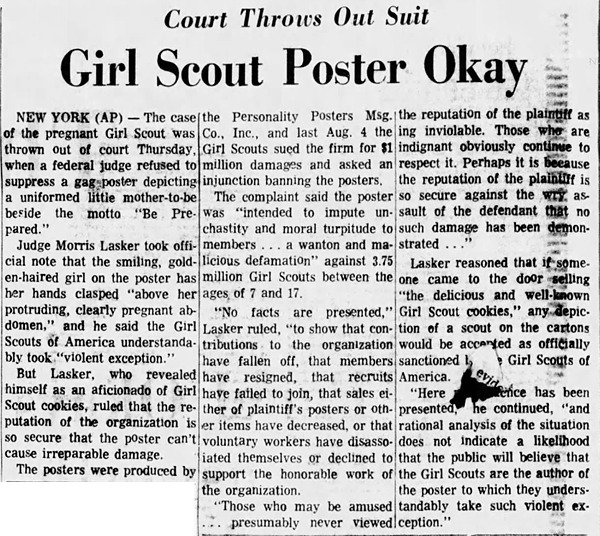
Austin American - Oct 10, 1969
Posted By: Alex - Tue Oct 09, 2018 -
Comments (6)
Category: Lawsuits, 1960s, Pregnancy
Are Crunchberries real?
A classic, weird lawsuit from 2009. As summarized by legalinfo.com:She sued on the grounds that the cereal advertised falsely. She reported that she was suing for herself, and every other consumer that had been “tricked” by the cereal company. According to the complaint, Sugawara and other consumers were misled not only by the use of the word “berries” in the name, but also by an image on the front of the box, which features the product’s namesake, Cap’N'Crunch, aggressively “thrusting a spoonful of ‘Crunchberries’ at the prospective buyer.” The plaintiff brought claims for fraud, breach of warranty, and the California Unfair Competition Law and Consumer Legal Remedies Act.
Long story short, the judge didn't buy her argument. You can read the full decision here (pdf).

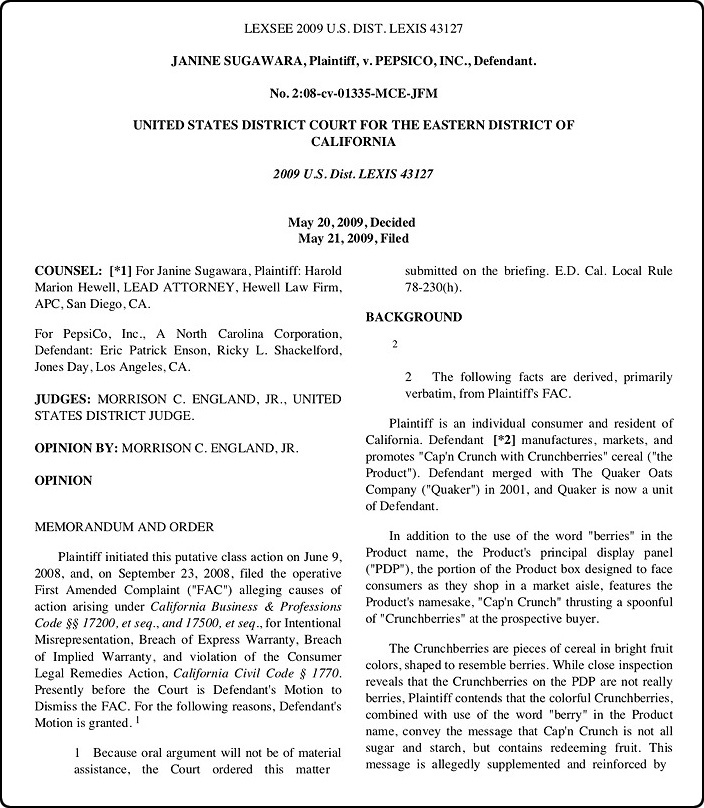
Posted By: Alex - Sat Sep 29, 2018 -
Comments (5)
Category: Lawsuits

| Who We Are |
|---|
| Alex Boese Alex is the creator and curator of the Museum of Hoaxes. He's also the author of various weird, non-fiction, science-themed books such as Elephants on Acid and Psychedelic Apes. Paul Di Filippo Paul has been paid to put weird ideas into fictional form for over thirty years, in his career as a noted science fiction writer. He has recently begun blogging on many curious topics with three fellow writers at The Inferior 4+1. Contact Us |




